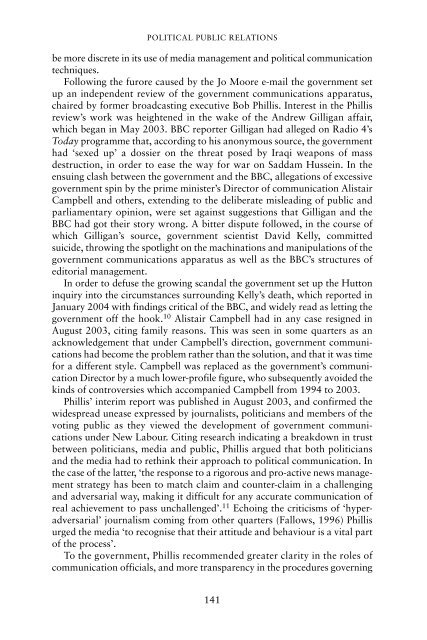20130412164339753295_book_an-introduction-to-political-communication
20130412164339753295_book_an-introduction-to-political-communication
20130412164339753295_book_an-introduction-to-political-communication
You also want an ePaper? Increase the reach of your titles
YUMPU automatically turns print PDFs into web optimized ePapers that Google loves.
POLITICAL PUBLIC RELATIONS<br />
be more discrete in its use of media m<strong>an</strong>agement <strong>an</strong>d <strong>political</strong> <strong>communication</strong><br />
techniques.<br />
Following the furore caused by the Jo Moore e-mail the government set<br />
up <strong>an</strong> independent review of the government <strong>communication</strong>s apparatus,<br />
chaired by former broadcasting executive Bob Phillis. Interest in the Phillis<br />
review’s work was heightened in the wake of the Andrew Gillig<strong>an</strong> affair,<br />
which beg<strong>an</strong> in May 2003. BBC reporter Gillig<strong>an</strong> had alleged on Radio 4’s<br />
Today programme that, according <strong>to</strong> his <strong>an</strong>onymous source, the government<br />
had ‘sexed up’ a dossier on the threat posed by Iraqi weapons of mass<br />
destruction, in order <strong>to</strong> ease the way for war on Saddam Hussein. In the<br />
ensuing clash between the government <strong>an</strong>d the BBC, allegations of excessive<br />
government spin by the prime minister’s Direc<strong>to</strong>r of <strong>communication</strong> Alistair<br />
Campbell <strong>an</strong>d others, extending <strong>to</strong> the deliberate misleading of public <strong>an</strong>d<br />
parliamentary opinion, were set against suggestions that Gillig<strong>an</strong> <strong>an</strong>d the<br />
BBC had got their s<strong>to</strong>ry wrong. A bitter dispute followed, in the course of<br />
which Gillig<strong>an</strong>’s source, government scientist David Kelly, committed<br />
suicide, throwing the spotlight on the machinations <strong>an</strong>d m<strong>an</strong>ipulations of the<br />
government <strong>communication</strong>s apparatus as well as the BBC’s structures of<br />
edi<strong>to</strong>rial m<strong>an</strong>agement.<br />
In order <strong>to</strong> defuse the growing sc<strong>an</strong>dal the government set up the Hut<strong>to</strong>n<br />
inquiry in<strong>to</strong> the circumst<strong>an</strong>ces surrounding Kelly’s death, which reported in<br />
J<strong>an</strong>uary 2004 with findings critical of the BBC, <strong>an</strong>d widely read as letting the<br />
government off the hook. 10 Alistair Campbell had in <strong>an</strong>y case resigned in<br />
August 2003, citing family reasons. This was seen in some quarters as <strong>an</strong><br />
acknowledgement that under Campbell’s direction, government <strong>communication</strong>s<br />
had become the problem rather th<strong>an</strong> the solution, <strong>an</strong>d that it was time<br />
for a different style. Campbell was replaced as the government’s <strong>communication</strong><br />
Direc<strong>to</strong>r by a much lower-profile figure, who subsequently avoided the<br />
kinds of controversies which accomp<strong>an</strong>ied Campbell from 1994 <strong>to</strong> 2003.<br />
Phillis’ interim report was published in August 2003, <strong>an</strong>d confirmed the<br />
widespread unease expressed by journalists, politici<strong>an</strong>s <strong>an</strong>d members of the<br />
voting public as they viewed the development of government <strong>communication</strong>s<br />
under New Labour. Citing research indicating a breakdown in trust<br />
between politici<strong>an</strong>s, media <strong>an</strong>d public, Phillis argued that both politici<strong>an</strong>s<br />
<strong>an</strong>d the media had <strong>to</strong> rethink their approach <strong>to</strong> <strong>political</strong> <strong>communication</strong>. In<br />
the case of the latter, ‘the response <strong>to</strong> a rigorous <strong>an</strong>d pro-active news m<strong>an</strong>agement<br />
strategy has been <strong>to</strong> match claim <strong>an</strong>d counter-claim in a challenging<br />
<strong>an</strong>d adversarial way, making it difficult for <strong>an</strong>y accurate <strong>communication</strong> of<br />
real achievement <strong>to</strong> pass unchallenged’. 11 Echoing the criticisms of ‘hyperadversarial’<br />
journalism coming from other quarters (Fallows, 1996) Phillis<br />
urged the media ‘<strong>to</strong> recognise that their attitude <strong>an</strong>d behaviour is a vital part<br />
of the process’.<br />
To the government, Phillis recommended greater clarity in the roles of<br />
<strong>communication</strong> officials, <strong>an</strong>d more tr<strong>an</strong>sparency in the procedures governing<br />
141
















